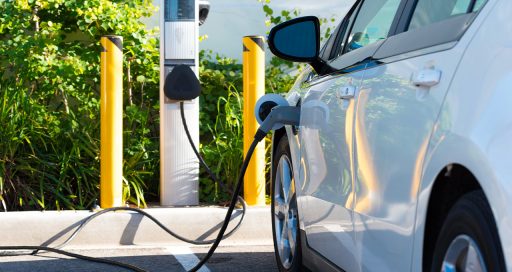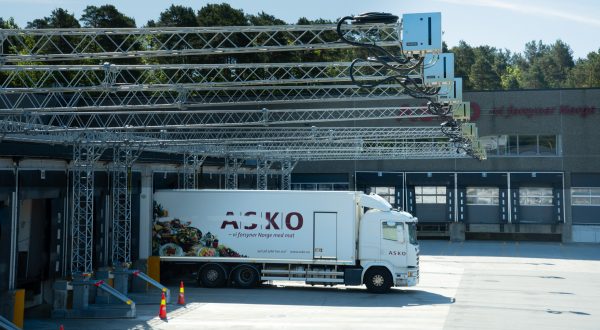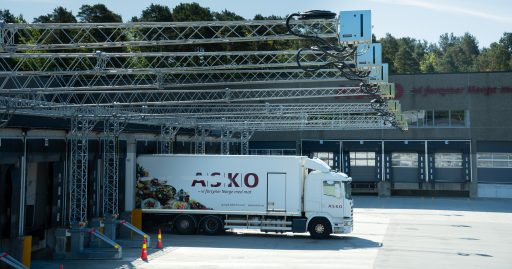“Plug and charge” for open interoperability between electromobility providers
Reading time: 4 min
To facilitate the user experience, secure the movement of data and accelerate the rollout of smart charging for electric vehicles: these are the aims of the Mobena project, which is supported by VINCI Energies.

On 7 December 2023, a unique experiment took place in France, at a service area on the multimodal motorway in Longvilliers (Yvelines), south of Paris, which the VINCI Group operates as a mobility laboratory. On that day, engineers from numerous mobility manufacturers and startups were firmly focused on the movements of two cars and how their drivers behaved.
The purpose of this event as part of the Mobena project, which involves businesses from across the entire electromobility value chain (see box), was to perform real-world testing of a new generation of electric vehicle chargers, which offer a comfortable user experience and enhanced security for data exchanges between the various technical links in the value chain.
“Plug and charge”
The aim of the experiment was to validate “plug and charge” technology, which allows direct communication between the vehicle and charging point without the driver having to present their toll tag. Around 90% of electric vehicle owners in France have a subscription with at least one mobility operator. Most of them are registered with multiple networks and so have multiple tags.
“Creating a market that is open and competitive beyond France’s borders”
“With ‘plug and charge’, motorists simply plug the charging cable into their car to start charging and also activate the extremely secure payment and billing process, which uses a digital certificate exchange system,” explains Júlia D’Avila, Product Owner at Citeos.
In Longvilliers, VINCI Energies teams dedicated to electric mobility worked in partnership with two car makers – Renault Group and Stellantis, two charging station manufacturers – Hager and IES Synergy, and the interoperability platform Gireve.
Interoperability and electromobility
But behind this simplicity for the user lies a major challenge for the businesses developing this new electromobility solution, which relies on open interoperability between the different suppliers. The ultimate aim of the technology trialled on 7 December 2023 is to allow any vehicle to charge at any station from any service provider.
“The great innovation with this model is definitely its universality,” says Mathieu Aveline, Electric Mobility Manager at VINCI Energies. “This requires interactions between numerous providers through a variety of data interfaces, which means adopting a baseline architecture, both technical and organisational. You therefore have to reverse the process, starting from the standard, in this case ISO 15118, and ensure everyone involved adapts to a common framework of rules.”
European scale
The next step for the VINCI Energies teams is to validate “plug and charge” in other configurations, particularly in urban settings. By creating a market open to all electromobility providers, and allowing end users and operators alike to freely select their service providers, this technology is key to accelerating the growth of electromobility.
According to Mathieu Aveline, “The ambition for the VINCI Group and every other every player invested in this next-generation charging system is clearly to create a market that is both open and competitive beyond France’s borders. The Mobena project has therefore set up a dissemination unit with a view to collaborating with EU organisations to build a solution that can be replicated at the European level.”
A large-scale project
The testing performed at the VINCI Autoroutes service area in Longvilliers was part of a large-scale programme – the Mobena project. This launched in 2021, with support from the French Institute for Energy Transition VEDECOM, and is based on a consortium of companies representing the entire electric mobility value chain in France: energy firms, vehicle and charging station manufacturers, charging infrastructure operators, electric mobility and technology service providers, and cyber security specialists.
Partners including Atos, Chargepoly, CRITT M2A, EDF, FEV France, Gireve, Hager, IES Synergy, Legrand, Nexans, Renault, SAP Labs, Schneider-Electric, Stations-e, Stellantis, Thales, TotalEnergies, Valeo, and VINCI Energies are already sharing interoperability guides, technical roadmaps, tests and demonstrations, promotion of ISO 15118, and communication standards between electric vehicles and charging stations.
06/13/2024
Learn more:
mobena.org





